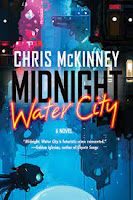The hazy, distant, unreliable parts of my memory tell me that as a teen in the 90s I watched an animated series for adults that was part of CBS’s evening schedule. The Simpsons, Family Guy, Rick & Morty, etc., etc., are now part of mainstream culture, but back when dinosaurs roamed the Earth, it was almost an unheard of thing: an adult cartoon in a time slot usually reserved for family sitcoms like Major Dad or other such rubb—ahem, shows. The series sticks in my brain because it was underwater, and the cast of characters, anthropomorphized fish, yes. Thanks to the wonders of the internet I can now check my dear ol’ memory, and indeed there was a show, Fish Police (only three episodes before getting the axe.) Underwater detective work the name of the game, Fish Police came to mind while reading Chris McKinney’s novel Midnight, Water City (2021).
Midnight, Water City starts, as many classic mysteries do, with the discovery of a murdered body, that of super scientist Akira Kimura. The main character, an unnamed detective, is first on the scene, and having known her at various times in the past, makes it his personal mission to find the killer. A famous recluse, Akira discovered the asteroid heading toward Earth and put in place the technology which prevented it from shattering our globe. Humanity nevertheless was forced to move—not underground but below the sea. The detective must traverse Water City searching for clues, interviewing suspects, all to get to the bottom of the mystery.
Midnight, Water City does its detective noir thing reasonably well. The world-weary character voice. The emotional distance to the crime. The lines-within-lines-within-lines of suspect interviews. I don’t believe a fedora and trench coat are mentioned, but the reader can tell this is the visual McKinney was aiming for. "The dame was playing fast and loose, and I wasn't havin' any of it..."
But if the plot intro above gives you any hints as to the elements of the book beyond detective noir, it’s not very exciting. Midnight, Water City is more a work in progress. Story transitions are not as effective as they could be. Certain key scenes are not imbued with the weight/importance that such a murder mystery almost demands. And mood, atmosphere, they are almost non-existent—a sin for noir and a sin for a story told in an underwater city.
I have played a video game called Bioshock. The entirety takes place in an underwater city built in neon modernist style. Players don’t get a sense of “city” per se. Everything is inside tunnels and rooms. Some rooms may be theaters or arcades, just as much as they may be laboratories or apartments, but there is no macro view to the city. As if inside an aquarium, the player is always behind walls or glass, the coral, fish, plants, and sea life just beyond sub-consciously reminding them of the reality of their environment. Midnight, Water City rarely provides this feeling. There is no sense of claustrophobia or weight of water hanging above, or even humidity or dampness. It could be Any City, USA in most scenes. (See Ian McDonald’s Luna series for a good example how to make a non-standard human environment part of a novel’s atmosphere and story.)
And the lack of atmosphere appears in other areas, also. For a story seemingly dependent on its world, there isn’t a lot of imaginative color. The city has “seascrapers” and “floatburbs”. Really? I know Jimmy Page stole all of the good guitar licks, but in 2021 the best we can do is “floatburbs”? The story goes through tried and true paces—not 100% predictable, but on several occasions, yes. To be fair, the ending offers a nice spot of imagination, one that leaves the reader with a good feeling through the final pages, but it doesn’t make up for the mediocrity leading to that point.
Raymond Chandler and Dashiell Hammett created the detective noir archetypes we recognize to this day. Question is, almost a century later, is the form still viable? Chris McKinney in his Midnight, Water City aims to answer that question in the positive. His method: imitation. By taking that route McKinney forces himself to either equal those noir greats, or be better. Anything less, and the comparison is unfavorable. In Midnight, Water City we have less. Had McKinney chosen the self-aware route (as more often noir is done is these days), there is a chance to escape such comparison. But by trying to do pure noir, it’s inevitable to be set aside Chandler and Hammett, and in this case, it’s unfavorably.
As such, Midnight, Water City is a novel likely only recommendable to readers who have a minimal conception of what detective noir is, or readers who enjoy that form of writing, regardless of quality. The sf/imaginative elements are poor when it comes to atmosphere and mood but are better in the devices influencing the plot, and occasionally bits of the setting. As a whole, this is an average novel. I’m not sure if it deserves to be axed as fast as Fish Police was, but I also don’t believe it deserves to be extended into another season unless improvements are made.


No comments:
Post a Comment